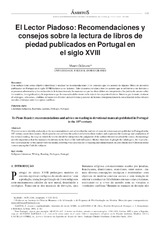El Lector Piadoso: Recomendaciones y consejos sobre la lectura de libros de piedad publicados en Portugal en el siglo XVIII
To Pious Reader: recommendations and advice on reading in devotional manuals published in Portugal in the 18th century
Autor
Dillmann, Mauro
Editor
Asociación de Estudios de Ciencias Sociales y HumanidadesFecha
2016Materia
Literatura ReligiosaEscritura
Lectura
Prólogos
Portugal
Religious Literature
Writing
Reading
Prologues
METS:
Mostrar el registro METSPREMIS:
Mostrar el registro PREMISMetadatos
Mostrar el registro completo del ítemResumen
Este trabajo tiene como objetivo identificar y analizar las recomendaciones y los consejos que los autores de algunos libros de devoción publicados en Portugal en el siglo XVIII hicieron a sus lectores. Tales discursos revelan cómo los autores que se refirieron a sus lectores y expresaron advertencias y la conducción de la lectura deseada, las maneras en que las obras deben ser interpretadas, los juicios de autores sobre los sentidos, los significados y la importancia que los manuales deben tener en la vida de los creyentes/lectores. Interesa, por lo tanto, destacar el «diálogo», «discurso», «hablar» del autor con el lector, deducir formas y razones de lectura e interpretación en la consolidación de las virtudes morales cristianas entre los sujetos católicos. This text aims to identify and analyze the recommendations and advice that the authors of some devotion manuals published in Portugal in the 18th century made their readers. Such speeches reveal how the authors referred to their readers and expressed the warnings and conduction of the desired reading, the ways in which the works should be interpreted, the judgments of the authors themselves about the senses, the meanings and the importance that the manuals should take in the lives of the faithful/readers. Matter, therefore, highlight the «dialogue», the «speech», the «conversation» of the author with the reader, inferring ways and reasons of reading and interpretation on consolidation of Christian moral virtues among the Catholic subjects.

